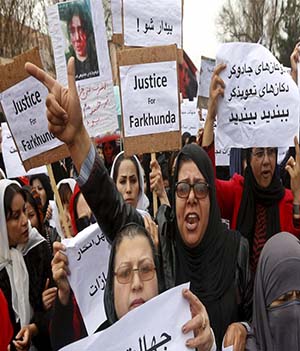Farkhunda’s Sisters – Recasting the Social Narratives of Afghan Women

In March 2015, twenty-seven-year-old Farkhunda Malikzada was horrifically murdered by an angry mob in front of the Shah-Do-Shamshira mosque in downtown Kabul. She was falsely accused of burning the Quran. The response to the cruel murder took on a life of its own, as a video of it went viral on social media, igniting protests, solidarity walks, and calls for justice both within Afghanistan and internationally. Public outrage, coupled with technology brought to the fore discussions and debates surrounding women’s rights, Islam, and culture. Most importantly, for many Farkhunda’s death became a symbol of struggle for a more just and peaceful Afghanistan where women are treated with dignity. This appalling incident served as a ‘turning point’ for the fight for women’s rights and gender justice in Afghanistan. Her tragic death became a point of profound introspection for women who sought to come to terms with the society they live in, and the difficulties of navigating the hyper conservative environment. Farkhunda’s bloodied body laid bare Afghan women’s struggles, invoking questions as to how a situation could arise where a woman is violently beat to death by a mob for speaking up against what she considered to be un-Islamic practices.
Farkhunda’s death is a stark reminder of the ways in which Islam has been wrongly used by men and mullahs in Afghan society to the point where dissent and disagreement by women can lead to such a heinous crime. Farkhunda’s death is reminiscent of countless female ‘martyrs’ before her who were murdered for raising their voice against injustice and risking their lives to defend women’s rights across Afghanistan – women such as Meena (founder of the Revolutionary Association of the Women of Afghanistan, commonly referred to as RAWA), Malalai Kakar (Afghanistan’s highest-profile policewoman after the fall of the Taliban), and female politicians such as Safia Ahmed-jan and Hanifa Safi. While these murders all targeted prominent female public figures, Farkhunda’s death is considered a ‘turning point’ in Afghanistan as it ignited a charged public reaction resonating with women from all walks of life as they protested against a society forcing women to remain silent, even against unIslamic practices. Within the existing cultural-religious framework, a space has opened up where laywomen who were previously forced spectators in societal affairs now feel able to raise their voices opposing violence perpetrated against women.
For women in Kabul caught within patriarchal societal structures, Farkhunda’s case was the revolution they needed to carve out spaces for engagement in the strongly male-dominated society. Farkhunda’s murder reignited the social consciousness of the people, for men and women alike, by providing a voice to countless voiceless women to speak out against such atrocities in a way that was not previously possible. This reawakening is indicative of a ‘third space’ within which women are negotiating their gendered identity as they engage in the public sphere alongside their male counterparts. The ‘third space’, as theorised by postcolonial scholar Homi Bhabha, is a place of ‘in betweeness’, sitting between social boundaries and dichotomies as where ideas, identities and positions are contested and reformulated. It represents an ambivalent space of negotiation where meanings are recreated. The third space encounter presents an opportunity for the subject to assert agency. The subject of the negotiation codifies experiences with new meanings, thereby destabilising the potentially hegemonic nature of the encounter of different religio-gendered expectations, in this particular case. Instead of having to conform to particular gendered expectations, Afghan women are able to operate within a third space as active, autonomous, and critical agents, allowing them to negotiate their gendered identity and reinvent the meanings of hegemonic norms in society. It provides them the opportunity to navigate gendered boundaries and directly have an effect on the dynamics of the interactions.
Within this ‘third space’ arising out of Farkhunda’s tragic murder, many Afghan women have been able to assert agency while navigating societal tensions. For many Afghan women, Farkhunda’s legacy has inspired a ‘third space’ within which identity formation takes place; an identity rooted in the mainstream tenets of the Islamic faith but that also challenges marginalisation and patriarchal injustice. Afghan women do not see the contradiction in being both a devout Muslim within the boundaries of an Afghan-Islamic cultural framework, while continuing the struggle towards a more progressive social justice for women’s rights. They thus work interstitially to construct their own space in society. It is within this liminal space that they begin to negotiate their gendered identity at once working within the boundaries of their culture and religion, while advocating for women’s rights within an Islamic framework.
In the aftermath of Farkhunda’s cruel and violent murder, Afghan women are seeking to redefine their gendered identity.The ‘third space’ being negotiated by these women is an attempt to reclaim their voices and create a new Afghanistan. An Afghanistan that casts old values in new meanings, creating a society that remains connected to Islamic values by emphasising tolerance and equitable treatment for all.
Farhana Rahman is a Cambridge International Trust Scholar and PhD Candidate at the Centre for Gender Studies at the University of Cambridge. She presently provides consulting services for various gender equality projects in the Global South, and was previously an instructor in gender studies at the American University of Afghanistan.
Academicians and Officials interested to publish their academic pieces on this page, please approach us through: opinions@aiss.af
The article does not reflect the official opinion of the AISS
